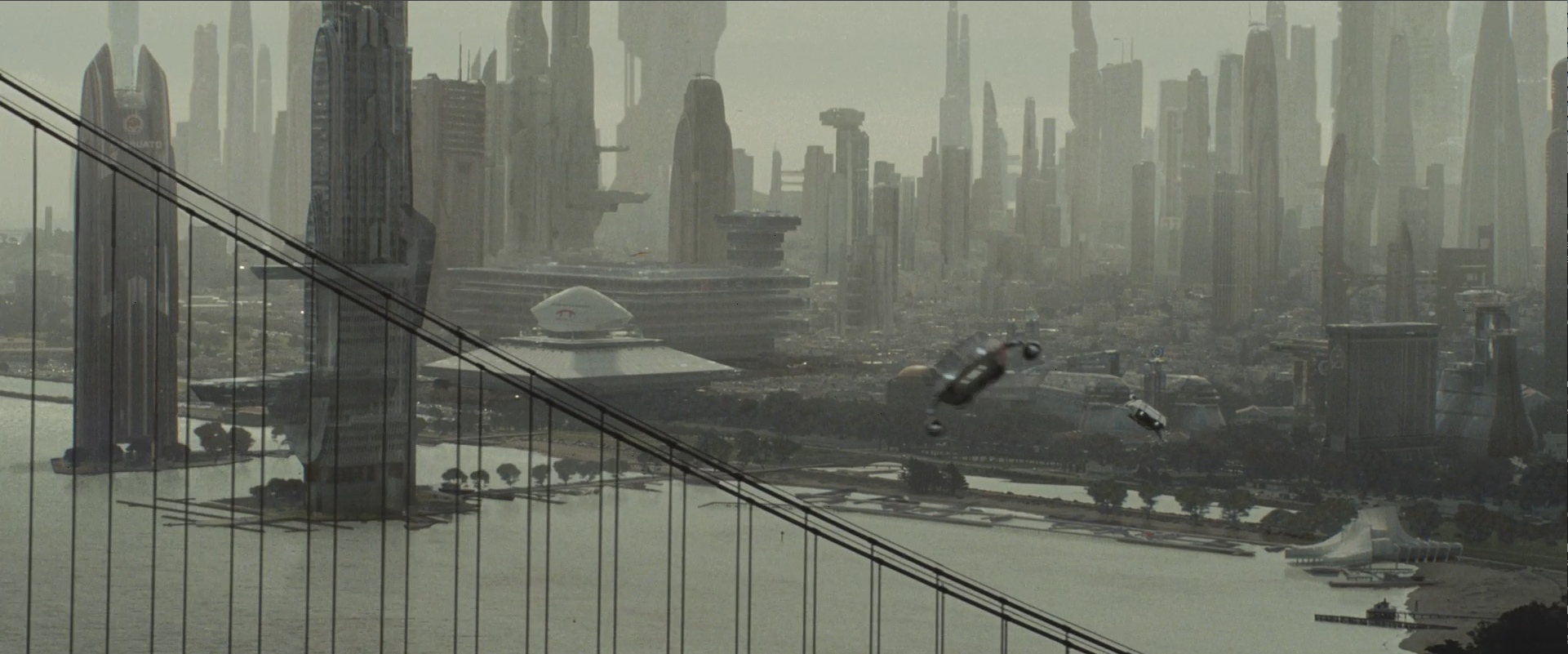
In
Who's Your City?, Richard Florida writes about some research that was done that looked into the question of whether there were similarities between biological organisms and cities in terms of resource consumption as a function of size:
[T]he researchers collected data from the United States, Europe, and China at a variety of times, and looked at a wide range of characteristics--things such as crime rates, disease transmission, demographics, infrastructure energy consumption, economic activity, and innovation. Sure enough, they found that
Social organizations, like biological organisms, consume energy and resources, depend on networks for the flow of information and materials, and produce artifacts and waste.... Cities manifest power-law scaling similar to the economy-of-scale relationships observed in biology: a doubling of population requires less than a doubling of certain resources. The material infrastructure that is analogous to biological transport networks--gas stations, lengths of electrical cable, miles of road surface--consistently exhibits sublinear [less than one] scaling with population.
This might all have been expected. But what the researchers had not expected to see was that the correlation between population growth and characteristics with little analogue to biology--such as innovation, patent activity, number of supercreative people, wages, and GDP--was greater than one. In other words, a doubling of population resulted in more than two times the creative and economic output. Unlike biological organisms, all of which slow down as they grow larger, cities become wealthier and more creative the bigger they get. They called this phenomenon "superlinear" scaling: "By almost any measure, the larger a city's population, the greater the innovation and wealth per person." This increased speed is itself a product of the clustering force, a key component of the productivity improvements generated by the concentration of talented people.
The theory is that the "clustering effect"--the phenomenon of talented, productive people interacting and networking with each other on a daily basis--is not just some side-benefit of lots of people living and working close together, but the principle driving force of economic growth all over the world. Hustle and bustle, in other words, generates
a disproportionate amount of wealth and innovation.
If true, then this means that the general culture of San Francisco--which favors anti-growth, anti-competitive policies all in the name of "cultural preservation"--has been ruinous. I remember a while back that there were protests in the Mission against a high-rise condominium that was going to be built--on Valencia, I think--so as to preserve the "character" of the neighborhood. But this--the building of big condominiums--is precisely the kind of activity that leads to denser populations and increases the capacity of the city and--as the research shows--
superlinearly increases the amount of wealth generated by the people here. That's money that not only is going to be spent here in the economy, but is also going to be taxed--and provide funding for city infrastructure, transit, and social services. It is not as if having half as many people in the neighborhood is going to result in half as much total wealth creation and innovation, with things on a per capita basis being roughly the same either way; this stifling of growth is
screwing everyone over, on a
per capita basis.Here in San Francisco there is always this fear that the city will become "Manhattanized"--that it will turn into a giant unlivable, uncharming slab of concrete and steel. I've always thought this was bunk. First of all, Manhattan is awesome--and in my opinion, at least as livable as San Francisco, if not more so (if you need proof of this, go ahead and try to get from my apartment in the Mission to North Beach using public transit. Be sure to bring a book). Second, though I also take issue with San Francisco's unique tendency to illegalize things for no other reason than that they kind of suck (chain stores are routinely denied permission to set up shop in various neighborhoods--just yesterday on public TV I listened to a store owner from Hayes Valley plead with the city council to keep the chain stores relegated to Union Square and Fisherman's Wharf), there is no reason why we can't channel the extra revenue from growth into a
positive subsidy for the things we want to keep around, rather than the current practice of a
negatively enforced (via the prohibition of new buildings and stores) subsidy. In other words, rather than preventing the condo from being built or the Gap from setting up shop, use the extra revenue generated from being pro-growth to explicitly prop up the stuff you want to keep around (like boutique shops or revival theaters or whatever).
So anyway, it's just a real shame that there's this anti-growth culture here, because it's really bad for the city--in economic terms, the denial of growth results in a deadweight loss (especially since the growth comes not from the scaling up of preexisting activities, but the creation of entirely new firms, products, and services--even industries).
On something of a related note, I read an article in the East Bay Express recently making the case that
you can't be an environmentalist if your anti-high-density growth--so if you're interested in Bay Area liberal hypocrisy, you're going to want to check that out.
(Photo brashly stolen from the
blog of one Peter Sciretta. It is a still of futuristic San Francisco from the recent
Star Trek movie--clearly, in the
Trek universe, the world pays izott its due heed.)
 Apparently, Obama went for the red-blooded-American choice, a Bud Lite. Can you imagine the shitfit the far right would have had if he had chosen something even vaguely fancy, like Crowley's Blue Moon? Or a Red Stripe?
Apparently, Obama went for the red-blooded-American choice, a Bud Lite. Can you imagine the shitfit the far right would have had if he had chosen something even vaguely fancy, like Crowley's Blue Moon? Or a Red Stripe?









You know, these free market principles make a lot more sense if you assume everyone has the same amount of money, and hence the dollars they allocate to something represent exactly their 'desire' for that object. So the person who wants it the most gets it, with the least fuss.
Fine, you can say that the people with more money have more entitlement to stuff, that is the idea of capitalism anyway. But when it comes to basic needs, yes, like parking, it's meant to be something everyone can get. So free market can totally screw it. The richest people get it, even if they don't want it that much (a bit of a stretch), and maybe even abuse it.
It's more of an obvious problem with, for example, gas. If there's a limited amount of it, and prices soar, then rich folks can use it to excess, and poor people can get seriously screwed. So price caps as a form of socialism seem necessary, even though it makes the distribution much less efficient.
I don't think what you're saying makes a whole lot of sense. You seem to have slipped into the mindset that goods and services are just magically already there in set amounts, and that what happens on the consuming end has no effect on what happens on the producing end.
But consumption drives production. If gas becomes very scarce, it is in everyone's interest for prices to reflect this (for them to "soar"), not because the rich are "entitled" to anything, but because high profit margins in the gas business will encourage people, in the aggregate, to divert more resources into producing more gas, and so there will be more gas for everyone, and prices will go back down--for everyone. Or, alternatively, if the gas supply cannot be increased any further (if we have reached "peak gas"), then the high cost of driving a gas-powered automobile will start to make non-gas-reliant modes of transportation more competitive, and people will find it profitable to start diverting resources into developing those new industries and technologies.
So I think in this case you are guilty of "shooting the messenger"--you're blaming the price for the problem, when really the price is just indicating the real problem, which is that the tradeoffs of producing this good--gas--are becoming too costly in comparison to other things we could be spending our time and energy on. By introducing price controls you're just "living in denial"--delaying progress by keeping everyone in the same spending pattern on the same products, even as the quality and access to those products steadily declines.
Of course, this free market pricing mechanism can't be applied to everything--sometimes there are extenuating circumstances. For example, with healthcare, we might decide that it's morally unacceptable to deny a poor person medical coverage in an emergency, and then find ourselves on a slippery slope, so that by the time we're giving away ER care for free, it actually is more efficient to give that person access to less costly preventive care that would prevent the costly trip to the ER in the first place. And so--boom--you're on your way to some form of socialized medicine. That's just fine.
But there are no such slippery-slope-inducing moral imperatives regarding parking spaces! Only a child of Los Angeles could believe something so patently absurd as the idea that "free parking" is a "basic need". It reminds me of the Woody Allen quote about LA: "I don't want to move to a city where the only cultural advantage is being able to make a right turn on a red light".